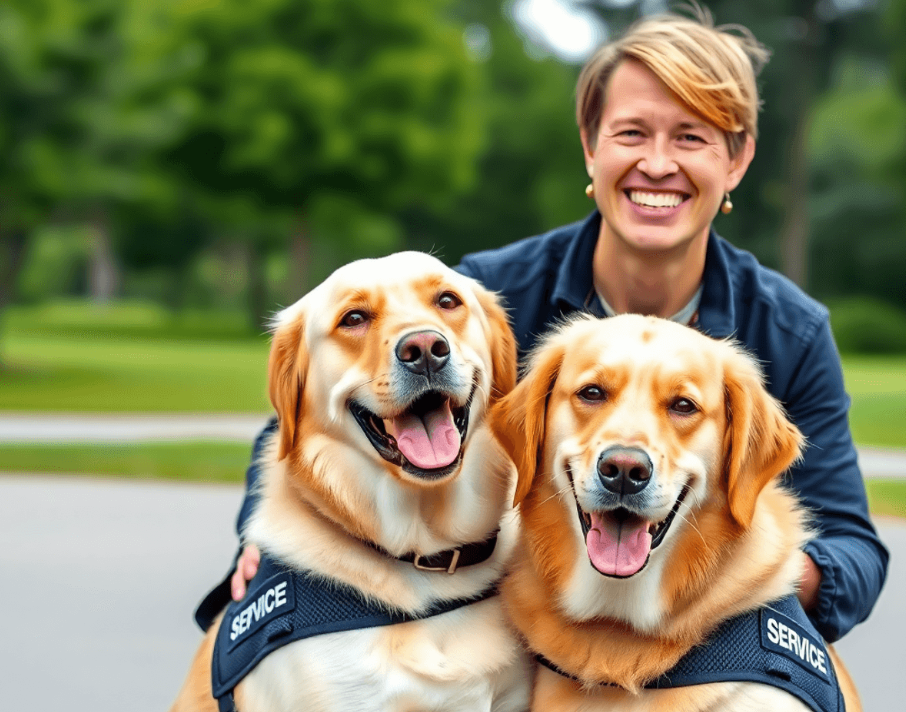Introduction
Service dogs play a vital role in the lives of individuals with disabilities. These specially trained companions provide support, independence, and assistance in daily activities. Understanding the responsibilities and considerations involved in owning a service dog is essential for prospective owners.
This article aims to offer good things to know and tips for owning a service dog. Key topics covered will include:
- Understanding the importance of service dogs
- Ongoing training and responsibility
- Costs associated with service dogs
- Public interaction and awareness
Knowledge about custom service dog ID badges will also be highlighted throughout the discussion.
1. Understanding Service Dogs
A service dog is specifically trained to perform tasks for individuals with disabilities. These can include:
- Types of Disabilities: mobility impairments, visual impairments, hearing impairments, medical conditions such as diabetes or epilepsy
- Specific Tasks: guiding individuals with visual impairments, alerting those with hearing loss to important sounds, retrieving items or assisting with mobility for physically disabled individuals, providing reminders for medication or alerting to medical emergencies
Understanding the role of service dogs enhances awareness of their importance and the significant difference they make in their handlers’ lives.
2. Ongoing Training and Responsibility
Ongoing training is crucial for service dogs to maintain their skills and adapt to their handler’s evolving needs. The training process does not end once the dog is certified; it continues throughout the dog’s life to ensure effectiveness in various situations.
Commitment from owners is essential. This commitment includes:
- Regular practice of commands
- Socialization with different environments
- Reinforcement of good behavior
- Custom identification card for your service dog
Bonding between the handler and dog enhances trust and communication, fostering a stronger working relationship. A well-trained service dog can make a profound difference in the handler’s daily life, supporting them in achieving greater independence.
3. Costs Associated with Service Dogs
Owning a service dog involves various expenses that prospective owners should consider:
- Training Costs: Professional training can range from $15,000 to $30,000 depending on the dog’s specific tasks and duration of training.
- Food Expenses: Quality dog food is essential for maintaining health, averaging around $50 to $100 monthly.
- Veterinary Care: Regular check-ups, vaccinations, and emergencies can accumulate costs of around $500 to $1,000 annually.
Good things to know: Financial planning is crucial. Consider setting aside a dedicated budget for ongoing care and unexpected medical expenses. Having a clear understanding of these costs aids in responsible ownership.
4. Public Interaction and Awareness
Public perception of service dogs can vary significantly. Many individuals may not fully understand the role of service animals, leading to misconceptions and sometimes inappropriate questions or behavior.
Reactions from the Public
Some people express curiosity, while others may display discomfort or ignorance. Handlers often encounter both supportive and unkind reactions, which can impact their experience in public spaces.
Understanding ADA Laws
Familiarity with the Americans with Disabilities Act (ADA) is crucial for both handlers and the general public. This legislation outlines the rights of service dog handlers and clarifies that no special identification or certification is required.
Educating Others
Sharing information about service dogs can foster understanding. Consider these approaches:
- Use social media platforms to raise awareness.
- Carry educational materials to share when questioned.
- Engage in community events to discuss the importance of service dogs and their roles.
5. Access Challenges
Accessing public spaces with a service dog can present unique challenges, including:
- Refusal of Entry: Some businesses may misunderstand the law and deny access.
- Unfamiliarity with Service Dogs: Staff or patrons may not recognize that a service dog is working.
- Physical Space Constraints: Crowded venues can make navigation difficult for both handler and dog.
Strategies for effective conflict resolution include:
- Educate Others: Carry information about access rights under the ADA to share when necessary.
- Stay Calm: Approach disputes with a composed demeanor to facilitate understanding.
- Seek Support: If issues persist, contact local advocacy groups or legal resources for assistance.
Being prepared can enhance interactions during business encounters while ensuring your rights are respected.
6. Health and Well-being of the Dog
Ensuring the health and well-being of a service dog is paramount. Regular veterinary care is essential for preventing health issues and maintaining optimal performance. Routine check-ups help detect any underlying conditions early, ensuring your dog remains healthy and capable of fulfilling their duties.
Exercise needs also play a critical role in a service dog’s life. Daily physical activity not only keeps them fit but also enhances their focus and energy levels during work.
Choosing the right gear is crucial for safety in public spaces. Select equipment that fits properly and is comfortable, which can include:
- Harnesses: Designed for functionality during tasks
- Leashes: Sturdy options that prevent escape
- Identification: Custom ID badges to signify their role
These considerations contribute to the overall well-being of your service dog, making them effective companions.
7. Emotional Support and Bonding
Building a strong bond with your service dog is crucial for both the handler and the animal. This relationship dynamic enhances teamwork and effectiveness in performing tasks.
- Emotional Connection: A deep emotional connection fosters trust, which is essential for the dog to respond to commands reliably.
- Patience Required: Navigating the ups and downs in this relationship demands patience. Challenges may arise during training or adaptation, but perseverance strengthens the bond.
Regular interaction through play, training sessions, and shared experiences contributes positively to the emotional health of both handler and dog, ensuring a fulfilling partnership.
8. Choosing the Right Dog
Selecting the right breed is crucial for effective service dog work. Consider these factors:
- Specific needs: Determine the tasks your service dog will perform, which can influence breed selection.
- Common breeds: Popular choices include Labrador Retrievers, Golden Retrievers, and German Shepherds due to their temperament and trainability.
Evaluate characteristics that make breeds suitable for service roles:
- Temperament traits: Look for dogs that are calm, friendly, and confident.
- Adaptability: A good service dog should handle various environments and situations without stress.
Choosing wisely ensures a rewarding partnership between handler and dog.
9. Legal Considerations
Understanding your rights under the Americans with Disabilities Act (ADA) is crucial for service dog owners. Key points include:
- No Registration Needed: Service dogs do not require special registration or identification. However, it’s beneficial to carry documentation from a healthcare professional stating the need for a service dog.
- Preparing for Questions: Be ready to answer questions about your dog’s role in assisting you. Under ADA regulations, staff can only ask two specific questions:
- Is this dog a service animal required due to a disability?
- What tasks has the dog been trained to perform?
These legal insights provide good things to know and tips for owning a service dog, ensuring you navigate public spaces confidently while advocating for your rights.
10. Social Dynamics
Having a service dog can significantly influence social interactions and relationships with family and friends. The presence of a service animal may evoke various reactions, from curiosity to discomfort.
Key Considerations:
- Family Reactions: Some family members may need time to adjust to the new dynamics a service dog introduces. Open communication about the dog’s role can help ease concerns.
- Managing Reactions: Educating friends and acquaintances about the purpose of service dogs fosters understanding. Sharing information about tasks performed by the dog can demystify their presence in social settings.
Navigating these dynamics requires patience, ensuring that both the handler and their service dog are supported.
Conclusion
Owning a service dog can be a life-changing experience, but it comes with significant responsibilities. Here are summary tips to consider before making this commitment:
- Thoroughly understand the needs of your specific disability and how a service dog can assist.
- Recognize the importance of ongoing training for both the dog and yourself.
- Plan for financial aspects, including training, food, and veterinary care.
The benefits of having a well-trained service dog are profound. Not only do they provide assistance and companionship, but they also enhance independence and quality of life. Good things to know and tips for owning a service dog revolve around preparation, understanding rights, and fostering a strong bond with your canine companion.







